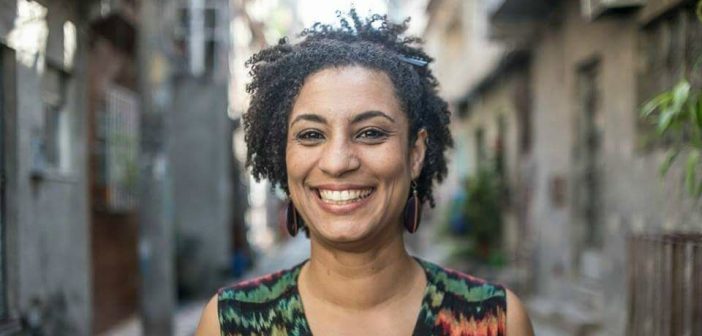A brutal murder exposes the deep crisis sweeping Brazil. Wednesday, March 16 city councilor of Rio de Janeiro Marielle Franco and her driver, Anderson, were murdered by a commando in a mafia-style attack. Elected as fifth member of her list in the City Council, with 46,000 votes, Marielle was a member of the Partido Socialismo e Liberdade, PSOL (Socialism and Liberty Party), a small, very active extreme-left party.
Born in one of the many favelas surrounding Rio, Marielle had studied and during years and years of activism she had gained a reputation as fighter against racism, social inequalities, for the LGBT movement, which she belonged to. Over the last few years, her campaigns had focused not only on traditional issues like violence by military police against the inhabitants of the favelas, but also on a federal intervention in Rio de Janeiro a month ago.
Faced with a situation of public order out of control, President Temer has divested virtually all civil and police powers by sending in a “Federal Interventor”, a sort of commissioner with extraordinary powers. Marielle, like many others in the country, was critical of the initiative labelling it as useless and ineffective. The clashes between the armed forces and drug dealers soccurred over the last few days, with casualties and injured among civilians, seem to prove her right. But the insecurity and the poor economic performance of Rio is just one side of a crisis that affects the entire country.
Over the last few days several demonstrations were held to commemorate the fourth anniversary of the “Lavajato”, a major national anti-corruption operation. For four years now, the judiciary of Curitiba, capital of Parana, led by judge Sergio Moro, has laid bare a frightening web of corruption within the political and economic sphere. A questionable andmuch criticised use of repentants has hit hard the political and economic class of Brazil. The most famous case, which has sent heavy shockwaves throughout the country, concerns former President Lula, who was sentenced to 9 years in prison and then to 12 years after the appeal.
Despite that, Lula leads the polls for the upcoming presidential elections in October polling an extraordinary 37%, but the Brazilian electoral law prevents candidates with convictions confirmed in the second degree of justice. Not to mention the possibility of being arrested according to the decisions of the STF, an organ a little short of a Constitutional Court and the highest judiciary body in the country. There is no shortage of critical voices of this choice which infringes the principle of presumption of innocence, sacrosant in states governed by the rule of law.
According to many commentators South America, in the past any political crisis would bring in the military, now it brings the judges. Due to the high costs of their salaries, judges are accused of becoming a powerful corporation. If economically-speaking the crisis finds some positive answers in the dynamism of the economic forces, the political realm is riddled with negative signals. The main political parties of the country have seen their leadership groups mowed down by the action of the judiciary. To date they do not seem capable of identifyuing a credible candidate for the upcoming presidential elections.
Experts see the risk of a Bolsonaro-type candidate, a dangerous mixture of right-wing extremism and rigid moralism backed by neo-Pentecostal supporters. Eventually, an ousider, “external” to politics, could also appear. Currently, 27 parties are represented in the Brazilian Parliament and an outsider would not know how to move and govern.
In the meantime demonstrations demanding justice and truth for Marielle continue. To this day everything remains obscure and the only certainty seems to be that anyone seeking justice will have to face a strong power. Only among the police forces, the militias and the drug traffickers can be found the reason behind the umpteenth killing among those who defend the civil rights of the Brazilians.
Robero Lovari
Latin America expert

